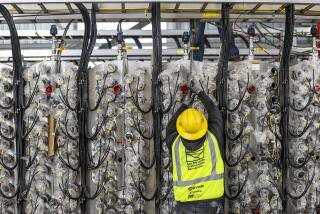EPA to again study Superfund status for Rocketdyne site
- Share via
The U.S. Environmental Protection Agency announced Thursday that it would reconsider whether to add Rocketdyne’s Santa Susana Field Laboratory near Simi Valley to the federal Superfund cleanup list.
The agency, which has assessed portions of the former rocket- and nuclear-testing facility since 1980, has decided for the first time to analyze the entire 2,800-acre hilltop lab.
The contaminated site in the hills between Simi Valley and the San Fernando Valley was last denied Superfund status in 2003 after the EPA reviewed only a portion of the lab property.
Betsy Curnow, who manages the Superfund Site Assessment Office for the EPA’s regional headquarters in San Francisco, said the analysis should be completed by year’s end.
The EPA will review studies conducted by Boeing Corp., Rocketdyne’s parent company and the property’s owner; the U.S. Department of Energy, which is overseeing current cleanup operations; NASA; and state health and water quality regulators.
Rocketdyne conducted nuclear testing for the U.S. government on a 90-acre portion of the field lab from 1954 to 1989. The work included operation of small nuclear-test reactors and recycling of spent fuel.
Rep. Elton Gallegly (R-Simi Valley) commended the EPA’s decision. He said his office had been urging the agency to again consider the lab for a Superfund designation, which provides additional funds for planning and cleanup.
U.S. Sen. Dianne Feinstein (D-Calif.) also welcomed the announcement, but said the EPA and Energy Department must work together “to ensure that the cleanup of the Santa Susana site is fully protective of the public’s health and safety.”
Daniel Hirsch, president of the anti-nuclear group Committee to Bridge the Gap, said he is suspicious of the timing of the EPA announcement, coming just days before a state Senate committee meeting to discuss legislation proposed by state Sen. Sheila Kuehl (D-Santa Monica). The legislation would prohibit the lab site from being sold for residential development unless it was cleaned up to stringent EPA standards.
“It’s a good move, glad they’re doing it,” Hirsch said. “But the public should not hold its breath that this will solve this problem.”
More to Read
Sign up for Essential California
The most important California stories and recommendations in your inbox every morning.
You may occasionally receive promotional content from the Los Angeles Times.










